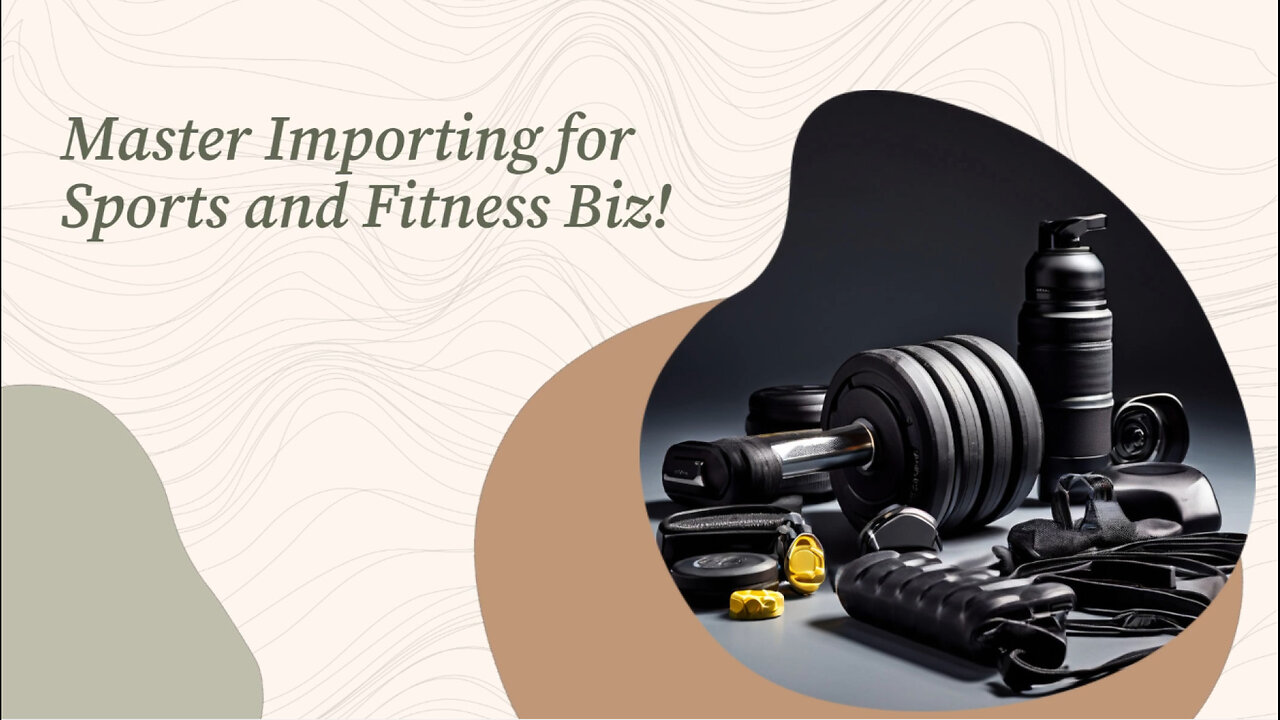Premium Only Content

Mastering the Importation Process: Sports and Fitness Goods Unveiled
ISF Template | 562-453-7357 | isf@isftemplate.com | www.isftemplate.com
Importing goods for the sports or fitness industry involves several important steps that require careful attention to customs brokerage requirements. Firstly, importers must obtain a customs bond, which serves as a financial guarantee between the importer and the US Customs and Border Protection (CBP) to ensure compliance with customs regulations. This is essential for goods with a value exceeding $2,500.
To navigate the complexities of customs entry, many importers rely on customs brokers, who act as intermediaries between the importer and the CBP. These licensed professionals possess in-depth knowledge of customs regulations, tariff classifications, and documentation requirements, ensuring that the goods are cleared through customs promptly and in compliance with the necessary regulations.
Another crucial aspect of importing goods for the sports or fitness industry is the Importer Security Filing (ISF), also known as the 10+2 rule. This rule requires importers to provide specific information about the cargo to the CBP at least 24 hours before it is loaded onto a vessel bound for the United States. By submitting this information, the CBP can identify potential security risks associated with the cargo before it reaches its destination.
Once the goods arrive at the port of entry, the CBP may conduct customs inspections to ensure compliance with regulatory agency standards, such as those set by the Consumer Product Safety Commission or the Federal Trade Commission. Importers must provide accurate information about the products and adhere to relevant regulatory requirements to avoid delays or penalties.
After customs clearance, the imported goods must be transported to their final destination. Importers have various transportation options available, including trucking, rail, or air freight. The choice of transportation method depends on factors such as cost, speed, and the nature of the goods. Importers can work with logistics providers to arrange transportation and ensure that the goods reach their intended location in a timely manner.
In summary, successfully importing goods for the sports or fitness industry requires careful attention to customs brokerage requirements. This includes obtaining a customs bond, working with a customs broker, submitting an Importer Security Filing (ISF), complying with customs regulations and regulatory requirements, and arranging transportation. By following these processes and collaborating with knowledgeable professionals, importers can streamline their importation process and bring high-quality sports or fitness products to the market.
#usimportbond
#isfcustomsbroker
#uscustomsclearing
#isfentry
Video Disclaimer Here: This video is designed for education and is unaffiliated with US government bodies.
00:33 - Customs Bond
00:58 - Customs Broker
01:43 - Importer Security Filing (ISF)
-
 9:37
9:37
EvenOut
21 hours ago $2.28 earnedThe Non-Reflecting Mirror Scare Twin Prank!
17.3K1 -
 11:19
11:19
Tundra Tactical
20 hours ago $3.09 earnedI Saw How CMMG Makes Guns.
24.7K6 -
 15:34
15:34
Misha Petrov
15 hours agoReacting To TikTok’s Most DELUSIONAL Takes!
31.3K26 -
 1:52:24
1:52:24
Squaring The Circle, A Randall Carlson Podcast
1 day ago#032 Flournoy Holmes' Artwork Helped Define The Southern Rock Phenomenon of The Early 1970's
24K3 -
 19:56
19:56
inspirePlay
1 day ago $0.34 earnedWalking with Lions & Facing Africa’s Wild Side | Safari Adventure with the Grid Championship Crew!
14.7K1 -
 10:50
10:50
RTT: Guns & Gear
1 day ago $1.05 earnedBudget Friendly Carry 2011: EAA Girsan Brat 2311
15.3K3 -
 3:49:06
3:49:06
Alex Zedra
17 hours agoLIVE! New Game | Nuclear Nightmare
106K14 -
 25:08
25:08
MYLUNCHBREAK CHANNEL PAGE
1 day agoUnder The Necropolis - Pt 2
288K80 -
 1:45:59
1:45:59
Spittin' Chiclets
1 day agoCanadian Chokejob - Game Notes Live From Chicago - 12.28.2024
265K32 -
 9:18
9:18
Space Ice
1 day agoThe Guyver - Alien Bug Suits, Exploding Dragons, & Mark Hamill - Weirdest Movie Ever
169K27